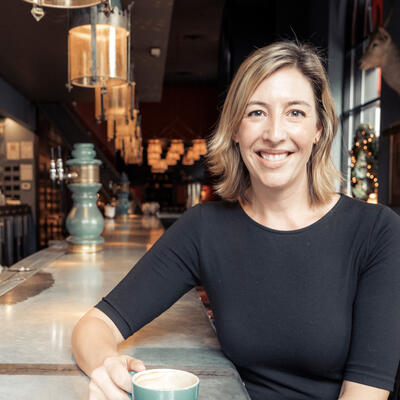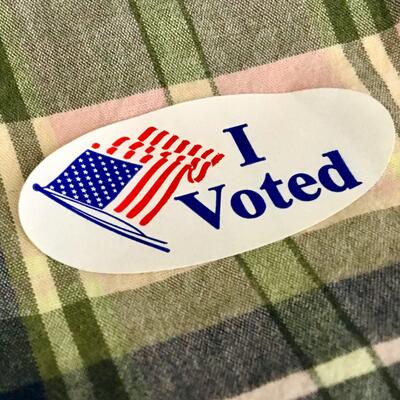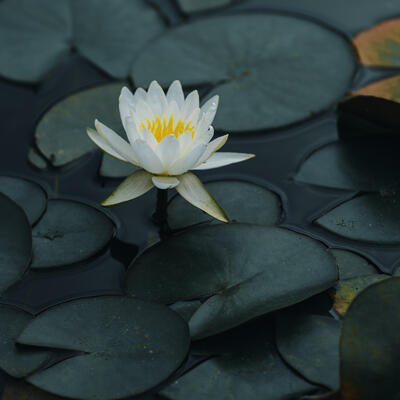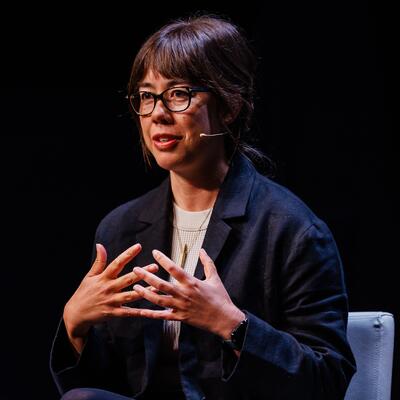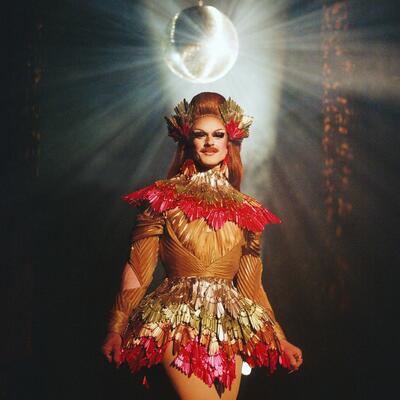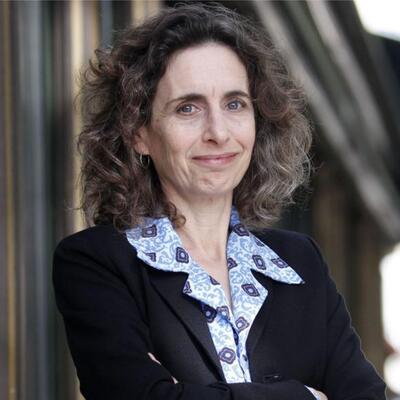
Elizabeth Kolbert on Hope, Despair, and Everything In Between
Guests
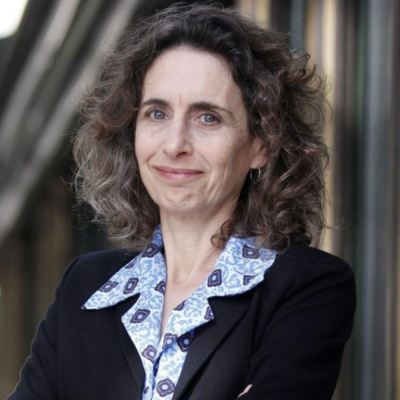
Elizabeth Kolbert
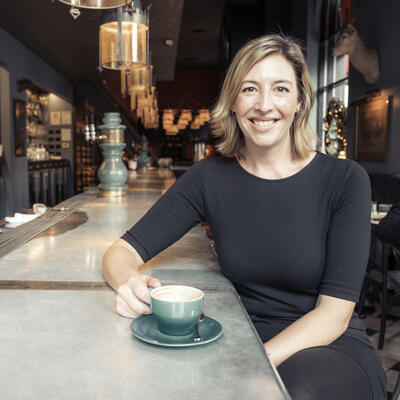
Molly Wood
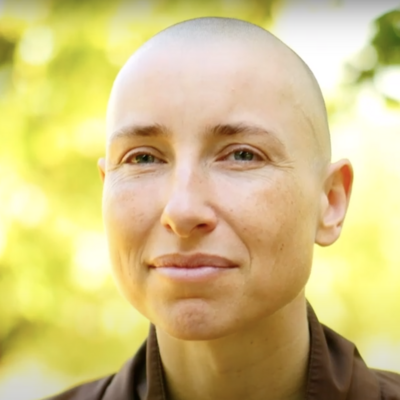
Sister True Dedication
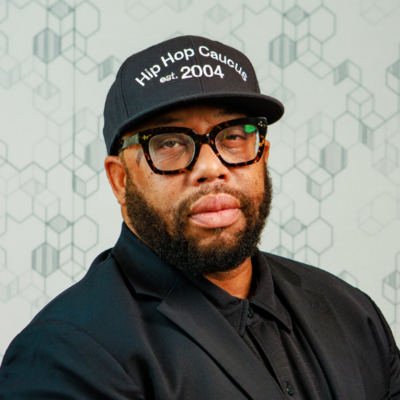
Rev. Lennox Yearwood Jr.
Summary
Even before Al Gore’s An Inconvenient Truth brought climate change to the mainstream, Pulitzer Prize-winning journalist Elizabeth Kolbert was on the beat. Kolbert says, “When I first started out, it was possible to find a lot of field scientists who would say to you: well, I'm not really seeing climate change. Now if you go back and talk to some of these same people, there's absolutely no doubt of what's going on.”
The culmination of Elizabeth Kolbert’s early reporting was the 2006 book “Field Notes from a Catastrophe,” which sounded the alarm on the causes and effects of global warming. Now nearly 20 years later, she is still bringing climate stories to the public with her most recent book “H is for Hope: Climate Change from A to Z.” Kolbert’s writing can often feel like a harsh dose of reality. Kolbert says that is because, “I subscribe to a pretty old fashioned view of journalism, which is that the journalist's job is really to report on what's going on. His or her job is not to tell you how to feel about it.”
One theory of how to create change is called the “information deficit model.” If we just give people the facts, they will do what’s needed to address a problem. In the case of climate change, many would say that the facts have been known for a long time and that the world doesn't need more information. But Kolbert says, “There're so many forces muddying the message these days, it's not entirely clear to me that we have adequately tested the information deficit model because there's still a lot of information deficit.”
Despite the title “H is for Hope,” Kolbert’s most recent book is not dedicated to finding hope. As Kolbert says, “We are heading into, and I say this without fear of contradiction, a time of climate instability. And it's not at all clear what the limits on that are.”
She also says of the book, “If you follow even a really great, climate change story to its end, you've only told one strand of this almost infinitely stranded story. And so I wanted to try to bring more of those strands together.”
“H is for Hope” takes a different approach than Kolbert’s earlier work. The chapters correspond with a letter, such as E is for Electrification or the titular H is for Hope, and are told in bite size vignettes. One of the most arresting chapters is D is for Despair, which contains only two lines: “Despair is unproductive. It is also a sin.” Kolbert says, “ the point of that entry was to acknowledge that as a legitimate and perhaps inevitable point that you reach, but to get beyond that.”
The climate crisis evokes emotions that span the spectrum from hope and optimism to grief and despair. Former BBC reporter turned Zen Buddhist Nun, Sister True Dedication describes climate grief as, “A sign of love. A reminder to keep that love alive and to do whatever I can in how I spend my time and energy to be a part of the solution.”
Sister True Dedication also suggests that working in the climate space may require action without being attached to the outcome of your action. Reverend Lennox Yearwood, Jr., CEO of the Hip Hop Caucus, echoes that sentiment: “You have to be okay knowing that you may not see the outcome, but you have to know that you're putting us on the right path.”
And sometimes, long term optimism is the motivating factor, as Climate Solutions Investor and Podcaster Molly Woods says, “I genuinely think we’re gonna figure it out. And I think the sooner we do it the better off people really truly could be.”
Elizabeth Kolbert headshot copyright: Elizabeth Kolbert
Episode Highlights
1:39 - Elizabeth Kolbert on her first trip to a weather station in Greenland in the early 2000s
6:25 - Elizabeth Kolbert on the efficacy of the information deficit model
8:16 - Elizabeth Kolbert on the format of her most recent book “H is for Hope”
11:48 - Elizabeth Kolbert on renewable energy around the world
15:39 - Elizabeth Kolbert on the “H is for Hope” chapter: D is for Despair
25:37 - Elizabeth Kolbert on the next wave of extinction
32:02 - Elizabeth Kolbert on self care as a climate journalist
37:33 - Molly Wood on optimism.
41:47 - Sister True Dedication on acting without attachment
49:01 - Rev. Lennox Yearwood Jr on being outcome independent
What Can I Do?
Resources From This Episode (4)
Full Transcript
Note: Transcripts are generated using a combination of automated software and human transcribers and may contain errors. Please check the actual audio before quoting it.
Greg Dalton: I’m Greg Dalton.
Ariana Brocious: And I’m Ariana Brocious.
Greg Dalton: And this is Climate One.
As media hosts, we like to think that more information equals more action, but it turns out the way we behave is more complicated than that.
Ariana Brocious: Right, the way we convey information really matters, and who the storyteller is, and climate in particular, is important. It’s a difficult and complicated story to tell. It's multifaceted. It has a whole bunch of implications.
Greg Dalton: Right. It's so big, it's hard for us to see. It doesn't have a villain with a human face. That's why I so admire the work of Elizabeth Kolbert. I read her book Field Notes from a Catastrophe back in 2006. She goes to far flung places and witnesses the warning signs of climate change. In fact, that book is a huge part of what motivated me to create Climate One in the first place. Thanks. Thanks. It was such a compelling read for me.
Ariana Brocious: And 20 years later, she's still at it. She's been covering climate for decades. And I always look forward to reading her work in the New Yorker because I know that it's going to be a compelling, insightful, and well written story that takes me somewhere and also gives me a real dose of reality about our climate present. In her new book, H is for Hope, Climate Change from A to Z, Colbert tries a different approach to climate storytelling.
Greg Dalton: Right? It's written in bite sized vignettes. You can jump into this point or that point, this letter, that letter, though I will say it's not entirely hopeful.
Ariana Brocious: Yeah, because she's a realist and a journalist and she's been covering climate for so long, she knows the score. That's why I was so excited to talk with her for this week's show. And I wanted to start the conversation by taking us back to her first trip to a weather station in Greenland in the early 2000s.
Elizabeth Kolbert: It's really, as close as you can get, I think, without leaving planet Earth to being on another planet. It's a very other, sort of otherworldly experience. If you're actually on the top of the ice sheet, it's just white snow in all directions, just this vast expanse of white. If you're sort of closer to the edge of the ice sheet, then it's a little bit more, nerve wracking, I suppose, because there are crevasses and all sorts of features to the ice then, and they're beautiful, they can be very beautiful, there can be these huge melt streams that are this fantastic color blue, and these moulins, which are these Just holes that develop in the ice where ice water just drops many, many thousands of feet. But being near one and I have been very near one, is a bit nerve wracking
Ariana Brocious: Yeah. And you've been back several times since that first trip. What changes have you observed? I mean, have you seen sort of with your own eyes the impacts of climate change?
Elizabeth Kolbert: Well, I don't want to, you know, say that I've seen with my own eyes because I'm not a native Greenlander, but the Greenlanders whom you speak to will tell you there are immense changes that they have seen in the course of, you know, just the last couple of decades. I'll give you one example. There's a town called Olulisat, which is on Greenland's west coast, and it's at the outlet of this large ice stream. Where these huge icebergs break off, fantastically beautiful, and two things that people in that town have noticed. First off, that the icebergs, which are still quite huge, have gotten smaller over time. Their elevation has just dropped, so their size has, has dropped. And secondly, this bay, this huge bay, it's called Disco Bay, used to freeze over in the winter and people ran dog sleds over it, and now it doesn't freeze. And so that's a huge, huge change as you can imagine.
Ariana Brocious: Yeah. Hmm. Well, you personally, like many of us have begun to witness some of these changes in your own neck of the woods. What have you seen, from your home in terms of changing impacts, changing seasons?
Elizabeth Kolbert: Well, anyone, you know, who's lived pretty much anywhere for a couple decades now, or even a couple of years, it sometimes seems can see big changes. What I've seen, you know, in the Berkshires, I live in Western Massachusetts in a area that where we have a lot of ski resorts. They're having, you know, tremendous trouble because the snow just, it's the season even of making snow. A lot of these snow resorts used to run on natural snow, which would be really impossible these days. And even the window for making snow has really, uh, crunched down to a very small window. Maple sugaring is, is a big, I don't want to say it's a big industry, but it's a lot of people make for sugar where I live. That window where you need these freezing nights and Warmer days. there's always a pretty small window for sugaring, but now it's just moved up so that it happens now. You used to have in, you know, April and now it's happening, can happen in the end of February this year. So, people have seen, really, really big changes in seasonality and that's just true everywhere.
Ariana Brocious: Yeah, we've been hearing those stories on the, on the show for the last several years. People really beginning to kind of understand that this isn't happening in the future, it's happening right now. You're a staff writer at the New Yorker magazine and lately you've written about rising sea temperatures, unprecedented natural disasters like Hurricane Otis and the ecological consequences of extractive industries. And to be totally frank, a lot of your reporting is a harsh dose of reality.for where we are in this climate moment, and I'm curious how you hope your work lands with readers.
Elizabeth Kolbert: Well, I guess I'd say I subscribe to a pretty. old fashioned view of journalism, which is that, the journalist's job is really to report on what's going on, and his or her job is not to tell you how to feel about it, or, or, or not to even think about that really, it's just to, to report the facts to the best of their ability, and so I, I guess that's what I'm reporting on, the facts to the best of my ability.
Ariana Brocious: Climate One co host Greg Dalton interviewed you on this show back in 2017, you said that solving this problem, climate disruption, climate change, is above your pay grade and that you hope to inspire people to think about it, but you can't take responsibility for what they do with the information. We had a recent episode where we discussed this idea of a information deficit model of climate communication and how it may be insufficient,since we've tried it for the last however many years and haven't seen a significant change in how people are necessarily responding to or perceiving of the problem. So at this point in your career, are you still convinced that that's the best path forward.
Elizabeth Kolbert: Well, I think, there are all sorts of ways to communicate climate change, there should be, you know, advertising campaigns, there should be a lot of other things, going on. but I think as a journalist, I mean, once again, I, I just don't know. I don't have the ability, I don't have the resources, to be honest, to, you know, test drive messages to go out there and say, well, would this story work? Would that story work? You know, we're just not equipped to do that. Um, we're, you know, sort of barely equipped at this point to get the information out. And, you know, the information deficit model, once again, that's being challenged on all fronts and not to get into contemporary politics, but, there's so many forces muddying the message these days,for many times often highly motivated reasons. It's not entirely clear to me that we have adequately tested the information deficit model because there's still a lot of information deficit, but, even if I had, you know, very clear evidence that that was not the way to communicate this message to motivate action, I still wouldn't have means to come up with a different way to do journalism. And, you know, I still think there's a function for the truth, even if the truth is not what is going to get us from A to B.
Ariana Brocious: Yeah, I echo that. There's definitely a role for the truth.
Elizabeth Kolbert: Yeah, that's something we could all, I hope, get behind, but I'm not sure.
Ariana Brocious: Yeah, I want to get into your new book, H is for Hope. This is an abecedary, which is, you know, each letter stands for a word. It's a totally different format than your other climate books, which are longer journeys made by following scientists around. This one is a short collection of essays on different aspects of the climate crisis that connect to each other in a really nice, longer narrative. So I'm curious why you took this format that differs so much from some of your past work.
Elizabeth Kolbert: Well, I was really trying to do a few things simultaneously, and one of which was to sort of re reanimate this story. I, I do think there's a way that people, you know, sort of, turn away from climate stories, they feel like they've read them before, what is there new to say? So sort of trying to break that open, break that story open. Catch people off guard a little bit, I guess. But the other other inspiration for it was that, you know, climate change is just such a huge story. It's not one story. If you follow even a really great, important climate change story to its end, you've only told one strand of this almost infinitely stranded story. And so I wanted to try to bring more of those strands together, and this seemed like a way to do that.
Ariana Brocious: And is part of the goal to be more accessible, maybe for readers who are daunted by a longer book?
Elizabeth Kolbert: absolutely. I mean, I hope that you could read this book, which is very beautifully illustrated by Wesley Alsbrook, and come away, once again, in a pretty short sitting, uh, with a pretty good sense of the whole landscape. which I think is, is, is, um, hard to acquire these days without reading several books on this topic. I think, I like to think you could get a pretty good, you know, sort of quick background on climate change.
Ariana Brocious: I think that's true. There's a lot, and there's a lot of contemporary reporting in here too. So I want to chat about a couple of these vignettes in a minute. Electrify Everything, this is the letter E, details the plummeting costs and massive expansion of renewable energy and describes a not so distant future where the U.S. runs on carbon free electricity. With the passage of the Inflation Reduction Act, electrifying our grid and all of our homes and cars is becoming much more possible. Then, you have a later chapter, Q for Quagmire, which details the extensive problems and complexities with our current electric grid and permitting. So I'm curious. You mentioned this, kind of multi strand nature of climate, but how do you reconcile those two states of affairs?
Elizabeth Kolbert: Well, that really does get back to the basic issue here. And I think at one point in the book, you know, I say it's to say that enormous strides are being made and to say that almost nothing has been done. Both are true and, and that is another, you know, sort of message of the book. I think there's a tendency to want to tell one story that has a very clear, you know, either we're doomed or we're going to be saved. You know, stories tend to fall into one of those modes. And I think that the, you know, truth, the awkward truth, the uncomfortable truth is that, um, all of these truths are true at the same time.
Ariana Brocious: Right. So another pairing, if you'll allow me, of some vignettes is Leapfrogging. So this covers the potential for parts of the world who have severe energy poverty to basically skip over fossil fuels entirely and move to a more resilient environment. ideally carbon free system of electricity. Then the chapter Shortfall describes the vast inequality baked into the climate crisis and the fact that the nations who've put most of the carbon in the atmosphere, the US, uh, Europe, Canada, uh, are not meeting their own carbon reduction targets and also very slow currently to commit money to help poor nations adapt. So how can poor countries leapfrog over fossil fuel dependence without the means to invest in those alternatives?
Elizabeth Kolbert: Well, that, that's sort of the great, you know, question of our time and this idea that, you know, there's so much inequality baked into the climate crisis, as you say, and, you know, you can't really say that people who have not contributed very much to the problem, but who very much want to develop and, you know, reach a better standard of living, which in, in our, the way that at least it's been conceived in the global north is very energy intensive. So I think India is a very good example of this. Now the most populous country in the world, relatively low. uh, contributor to historical emissions, but emissions growing very, very fast. So if you were sort of, you know, the world as a whole, and you said, what would be the sort of cheapest, um, best alternative for the world? You'd say, we should all invest in India so that India doesn't follow the same development path that the US and Europe and China followed, which were very fossil fuel intensive. It would be in everyone's interest to avoid those emissions Uh, and that would be the cheapest way to avoid those emissions. But getting the world, you know, to agree to that and invest in another country's development has turned out to be extremely difficult, bordering on impossible.
Ariana Brocious: Right, we've seen the creation of a loss and damage fund at one of the recent conference of parties, and there's been, I think, some, perhaps some money allocated to that, but it is slow, it's not happening, um, at the pace that's needed.
Elizabeth Kolbert: Yeah, no, it's a, the loss and damage fund has very little funding at this point, but if you go back, there were previous funds, you know, that arguably have never reached what they were supposed to reach. But I think the basic point. that this is very capital intensive. Investing in clean energy. I mean, the, the good news is once you've put the capital in, then the fuel quote unquote fuel, which is either, you know, the wind or the sun, let's say, is free, but the upfront costs are very high and that's particularly difficult for countries that don't have that kind of cash.
Greg Dalton: You’re listening to a Climate One conversation about hope, despair, and everything in between with journalist and author Elizabeth Kolbert.
Coming up, we look ahead to the next era in our climate future. And it’s clear that it’s unclear…
Elizabeth Kolbert: Now we are heading into, and I say this without fear of contradiction, a time of climate instability. And it's not at all clear what the limits on that are.
Greg Dalton: That’s up next, when Climate One continues.
Ariana Brocious Please help us get people talking more about climate by sharing this episode with a friend. And we’d love to know what you think of the show. Please give us a rating or review. You can do it right now on your device – and it really helps people find the show. Thanks!
This is Climate One. I’m Ariana Brocious.
Elizabeth Kolbert’s new book is called H is for Hope: Climate Change from A to Z. And it has a chapter for every letter of the alphabet: such as C is for Capitalism, J is for Jobs, T is for Temperatures. It’s a clever conceit… and also has a real narrative arc and flow.
But there’s one chapter that breaks the format – and when I encountered it, it sort of stopped me in my tracks – D is for despair. The chapter, if you want to call it that, only had two lines. It reads:
Despair is unproductive. It is also a sin.
I found those sentences really powerful… and so when I got the chance to speak with Kolbert, I asked her about them.
Elizabeth Kolbert: I think one of the advantages of this format was it allowed me to break the narrative in a way. And so, I actually wrote those first four letters in kind of a. a rush and got pretty quickly to D for despair. And then, that's sort of a moment in the narrative for a reset. But despair is a, you know, constant theme in climate conversations and climate coverage. And it's a pretty logical, you know, response to the actual facts and the numbers. but it doesn't get us anywhere. So the point of that entry was to acknowledge that, um, as a legitimate and, you know, perhaps inevitable point that you reach, but to get beyond that.
Ariana Brocious: But we do feel, and we all feel, and it can be really overwhelming to contemplate the scale of what needs to happen and, and, you know, how little we've actually accomplished. So how do you personally balance those competing things of kind of hope and despair?
Elizabeth Kolbert: Well, I never, in any way, hold myself up as a model of, you know, what other people should be doing, and that's both, you know, psychically and, practically. And, you know, I wouldn't say that I have, a good answer, and the last, year, I think, has really challenged even those who would like to be hopeful. The, you know, the, just the data that are coming in are, are really scary. They're very scary. There's just no other way to put it. so I, you know, I, I, like all people, I guess I live on many levels and in a, in a very long term and You know, 30, 000 foot level, I feel very worried, very worried for my kids, very worried for the world. And on a day to day level, like everyone else, I, go about my business and, and, and live the life of right now. And
Ariana Brocious: I think that's something extremely relatable.
Elizabeth Kolbert: That's the problem, to be honest, that we're all doing that, because what we really need is to be, you know, just doing nothing but sort of focusing on, uh, what we need to be doing. You know, doing the actions and it's very hard to get the world's attention long enough, you know, there's always another crisis that's intervening.
Ariana Brocious: Well, and there's the simple fact we all have these priorities. Those of us who are in the more comfortable parts of the world are accustomed to that level of comfort. And, the idea of changing it, you know, there's, there's this, I think often false assumption that addressing climate means sacrificing, means having to give up things,instead of maybe just tweaking them to a different way, which is the case, in many circumstances. And so, yeah, it's a pretty complex area. We've talked a lot about it on Climate One. And I think, you as someone who's covered it for so long, I'm curious, you know, this has been at least two decades you've spent covering climate change. And you recently wrote an article in the New Yorker about last year's Canadian wildfires. And you wrote the unusual soon became the unheard of. So how do you grapple with this sort of unprecedented and even the term unprecedented this new era that we're finding ourselves in when covering climate?
Elizabeth Kolbert: Well, I think that is the really, you know, terrifying aspect of it. And I, I don't think it's, you know, widely appreciated enough, although maybe as more and more of these unprecedented disasters strike, more and more people are really coming, you know, up close and personal with the unprecedented, we now know we can look at the climate of the last really 10,000 years in great detail, and we know that this moment that we're in, In which all of what we would call, you know, civilization, has existed as a moment of unusual climate stability in the whole, you know, climate record and the climate record of the last several hundred thousand years. And now we are heading into, and I say this without fear of contradiction, a time of climate instability. And it's not at all clear what the limits on that are. We just are in when you jack up the CO2 in the atmosphere, the way we have, which really has, you know, possibly never happened before in the history of the world that, that so much CO2 has been released so quickly. You don't know exactly what the impacts are going to be, and they could be sort of off the charts in ways that we can't even anticipate, scientists can't even, you know, exactly anticipate. There was a famous saying from Wally Broecker, who was a very important climate scientist, you know, climate is an angry beast and we are poking it with a stick. We don't know Uh, the honest truth, I think, would be we don't know exactly what the climate system has in store for us. We can be pretty sure it has some pretty bad stuff in store for us, but it could be even worse than many of the modeling studies suggest. And I think climate scientists, particularly in the course of this past year, when we've seen record after record after record fall, are starting to think some pretty, you know, are we missing something in these models? Maybe? And, and that is a very, you know, it's just very scary. The unknown is very scary when you have 8 billion people on the planet who are sort of dependent on the climate as we know it.
Ariana Brocious: Right. And another theme of this latest book and, and a lot of your writing is this sort of tipping points, right? And that there's these kind of feedback loops where we may hit a certain point and others have written about this too. And then all of a sudden it's like we are, we've passed a certain, you know, level of change and entered into a wholly new arena. And that's really scary. I mean, we don't know yet, right? Exactly when that might happen or,
Elizabeth Kolbert: Yes, I think there's more and more attention on these ntipping points, these points at which feedbacks in the climate system, it doesn't matter what we do at that point, these internal feedback loops will take over. And when I, you know, 20 years ago was first covering climate change, uh, Richard Alley, a glaciologist from Penn State, gave me this analogy, you know, you, you are on a rowboat, you rock the boat, it goes back to the same state, you rock it again, it goes back to the same state, and you rock it enough, and you get to another state, which is upside down, which is also stable, that's another stable state. So that's the big question, a lot of these systems, that we once again depend on unknowingly have quite possibly two stable states and we could be pushing some of them into the new stable state which with which humanity just has no, certainly not in recorded history, has no experience with that and really probably has no experience as a species, you know, not actually a very old species even. So there's probably, you know, we're probably pushing the climate out. It has been since we as a species evolved.
Ariana Brocious: Right. So in this, two decades that you've been covering climate or sounding the alarm on climate. How has the response changed?
Elizabeth Kolbert: The good news if you, uh, is that I think there's just much, much, much more awareness of climate change. you know, first, uh, started out, it was, it was, it was possible to find a lot of scientists, field scientists who, who would say to you, well, I, I'm not really seeing climate change and I'm not convinced that these models are correct, you know? Now if you go back and talk to some of these same people, and I have gone back and talked to some of these same people, they're like, oh, yeah, you know, absolutely. I'm seeing it in the field. There's absolutely no doubt of what's going on. And I think. that's true of the general public as well. Once again, it's just very difficult to avoid the signs of climate change these days. You know, everyone and many, you know, sort of ordinary activities as we were discussing, you used to go skate on that pond, you used to sled down that hill. Those are just not happening anymore. So you don't have to be, you know, much more than, you know, my kids, you know, kids are, You know, they're 25 years old. They remember sledding in the backyard. That was, that was just a big wintertime activity. Very unusual that you can do that these days. So, um, I think, you know, you don't have to be a weatherman, you know, to know which way the wind is blowing.
Ariana Brocious: Yeah. Very true. You won a Pulitzer Prize for your book, The Sixth Extinction, and the world has gone through several mass extinctions over its four and a half billion years. The fifth was that of the dinosaurs. And you say that humans are causing the world's sixth, and that as many as half the world's species could be headed for extinction by mid century. But you also write about how humans reached Australia 50,000 years ago and wiped out species like the wombat rhinoceros. So humans have been altering the world for a long time, right?
Elizabeth Kolbert: Yeah, I mean, I think the evidence is pretty compelling that the, what's called the megafauna extinction, which was this, sort of, you could call it a wave or you could call it multiple waves of extinction of very large animals. It was very selective against large, slow to reproduce animals that hit first Australia, then the Americas, then places like Madagascar, as humans moved, settled in new places. So I think there's very good evidence that, you know, already 50, 60,000 years ago humans were causing, uh, extinctions. I, I don't think that's, you know, I mean, it is still debated, but I don't think it's really debatable.
Ariana Brocious: Well, the pace and scale has changed, maybe.
Elizabeth Kolbert: Oh, absolutely. I mean, we, those animals that humans wiped out for presumably predominantly through hunting, you know, that might've taken, When we look back 50,000 years, we don't get very good resolution. It perhaps took You know, thousands of years to drive the, you know, uh, the megafauna of Australia extinct. Nowadays we are watching many species go extinct in real time. I mean, I've spoken to, in the course of reporting the sixth extinction, I spoke to many scientists who had watched on their own watch, you know, they'd started out studying X or Y, and it had disappeared, you know, in the course of doing their dissertation research. So, yes, this, this speed has increased, the rate has increased, and the sheer number and multiple classes of organisms that are being affected has, you know, shot up.
Ariana Brocious: So In each of the previous mass extinctions, percent of all life forms on earth went extinct in a relatively short time. Do you think humans are going to make the cut of this next wave?
Elizabeth Kolbert: Well that, that clearly remains to be seen. I mean, if you define a, a, you know, a major mass extinction and that is, as you said, the definition basically three quarters of the species on earth being wiped out. That's a, fortunately a high bar, uh, to reach we are, you know, nowhere near that at this point. But if you look at the forces that we have put into play, it kind of depends how long are we at this enterprise of transforming the world. And I think one of the important points to make, and it is another, You know, plexity or wrinkle, I suppose, on, um, you know, fighting climate change. Some of the very, you know, sort of solutions that are proposed or ameliorative measures that are proposed are very land intensive, for example. So, uh, you know, are you going to plant forests to soak up carbon? Are those going to be the kind of forests that the, you know, In need of wildlife need, are you going to put down many square miles of solar panels to generate clean energy? Is that going to displace a lot of the creatures that were living, you know, in those many square miles? So there are noeasy ways out at this point. I think that is unfortunately the case.
Ariana Brocious: Many years ago, I read a book called The World Without Us by Alan Wiseman, and it was this thought experiment of if humans just vanished one day, um, how long it would take nature essentially to kind of reclaim what we've, what we've done. And it was really interesting. And one particular anecdote that stands out was like the subway system, I think, in New York and how quickly it would flood and, you know, the things that we have to do to actually keep them functioning, pumping out the water and so forth. Obviously that's not an outcome any of us are looking for, but it is an interesting way to view things and I think can give us some perspective that though we fee really. powerful, and I think you, you comment on this in this latest book, this sort of hubris that we have as humans and our ability to control the world, that there is a limit, right? There's a limit to what we can do, um, without probably resulting in our own extinction.
Elizabeth Kolbert: Well, I think that we have, you know, one of our immense talents or maybe, maybe our true immense talent is, you know, very creative and very resourceful as a species. And that's why, you know, that's how we got to this point. That's why there are 8 billion people on the planet. That's a lot of, uh, of human biomass just to support. And you know, whether that experiment is sort of an experiment, uh, can continue, um, is, you know, at this level is, is really, you know, an open question. We are running many years ago, um, you know, one of the Roger Revelle, one of the very first people to sort of, uh, understand the significance of climate change, uh, back in the late 50s, said, you know, we are running a vast experiment. Which could never have been run before and will not be run again, you know, we we only have one planet Earth and in multiple ways we keep finding this. I mean microplastics are a really good example. Well, we just did it. We just decided to make a lot of plastics and that seemed like a good idea at the time But maybe it wasn't and now they're There's no way to get rid of all that plastic that's on the planet. So we just keep doing this. We just keep running these experiments. Uh, let's see what happens. And when you think about it, you know, just on a kind of gut level, well, yeah, maybe it, you know, works the first time and the second time and the third time and the fourth time. But, you know, at one of those times it's probably going to have some pretty serious consequences. And we're certainly seeing that, you know, with our experiment of using fossil fuels.
Ariana Brocious: Mm hmm. So what do you most want readers and our listeners today to understand about where we're at in this moment in the climate emergency?
Elizabeth Kolbert: Well, you've sort of summed it up. I mean, we are in an emergency. You know, if I were just speaking, you know, one on one with our listeners, we are in an emergency. I do think it's important that people understand that because I think that it changes your reaction to you. Um, various measures that are proposed if you say, well, that's, you know, as Al Gore famously put it, that would be inconvenient. It would be inconvenient to do X or Y. You do have to measure that against the alternatives. What are the alternatives? You know, so we've often had this conversation, like, well, I don't want to do this. We don't want to do this. We don't want to do that. But, the alternative you have to, everyone has to realize is change is coming, change is coming at us in a big way, and we can try to manage that change or we can let, you know, it sort of manage us. So that is, um, the sort of big message. I think from the book's perspective, the message that I want to leave people with, I would say it's not really a message book, you know, it's a book about, looking at this problem, this issue from multiple different perspectives, the perspectives of Americans, the perspective of non Americans, and, you know, introducing a lot of the many complexities of the issues without, I hope, uh, leaving people feeling completely overwhelmed. I, I'd like to say there, there's, I hope, I hope, and part of the point of doing it as an illustrated book, too, was, you know, there's a, there's, I hope, a certain amount of fun and pleasure, uh, in reading the book, even though the subject matter is obviously very heavy.
Ariana Brocious: There is. And I think you do walk that, you know, you kind of weave back and forth between more of the heavy things and some of the lighter things. So one of the chapter that I think it's H for Hope that really I found interesting was the rust, iron rust batteries technology, which I hadn't even heard of and, um, fascinating possibilities there.
Elizabeth Kolbert: Yeah, and that company that I wrote about, so H is for Hope, there's, you know, a section about, you know, many great new technologies that are being, um, developed. And that company that I sort of did a mini profile of in that section, Form Energy, is building a plant, even as we speak, in West Virginia to manufacture these huge batteries that rely on this idea that rust runs in one direction, but you can run it back in the other direction with energy that you have a sort of excess energy, like if you have a wind farm, for example, some days you just have excess energy that you can't put on the grid.
You can run these batteries, you can, you can store a lot of energy in these massive iron air batteries. And then when you need that energy, you can basically let the stuff rust again and run that process and get the energy back out. So it's, it's quite fascinating and it's, you know, actually happening.
Ariana Brocious: When we talked before, you, uh, said quite plainly that you do get tired of covering climate. Who wouldn't? Right? How do you take care of yourself, um, given that this is, you know, you're living the job you do day in and day out?
Elizabeth Kolbert: Well, I mean, I think that, you know, there are at this point thousands and thousands of people who are working on climate change pretty much, you know, full time. So I, I'm not exceptional, you know, in any way. It is something that, you know, haunts your, your, your days and nights, how's that? Um, but, um, you know, I guess I'd say there's a lot of people on planet Earth right now who have, you know, very, very acute, are facing very acute crises and war and famine and um, you know, terrible, uh, emergencies. So I don't, you know, I don't think it is productive or justified, you know, for me to in any way, you know, feel sorry for myself because I'm thinking about climate change. That's, that's a sort of a, any, anyone could be haunted by climate change. And many, many, I think increasingly many people are. That's why we have this whole term, you know, climate anxiety. So, you know, just count me, uh, among the climate anxious.
Ariana Brocious: Yeah, and I also want to allow for the fact that it's okay. I mean, you can only live in your own experience, right, and it doesn't discount the suffering and experience of others that's happening now. And also, the reason that many of us are anxious is because we anticipate much more suffering. So there's real reason behind it.
Elizabeth Kolbert: No, absolutely. I, I, I'm not in any way, uh, discouraging people, uh, from feeling anxious. Believe me, I wish I'm honestly more. I know that anxiety, you know, has a bad name, as it were, but I do think anxiety is a big, is a big motivator. We should be, you know, we should be anxious and we should be motivated by that anxiety.
Ariana Brocious: Elizabeth Colbert is a Pulitzer Prize winning journalist and author of the new essay collection, H is for Hope, Climate Change from A to Z. Elizabeth, thank you so much for joining us on Climate One.
Elizabeth Kolbert: Oh, thanks for having me.
Greg Dalton: Hope… Anxiety… There are so many feelings a lot of us wrestle with when thinking about our changing climate… including Grief. And of course, grief can manifest in lots of different ways. Coming up, Buddhist Sister True Dedication explains how she experiences that feeling… and how she copes.
Sister True Dedication: My grief is also a mindfulness bell, a reminder, uh, to keep that love alive and to do whatever I can in how I spend my time and energy to be a part of, of the solution.
Greg Dalton: That’s up next, when Climate One continues.
This is Climate One. I’m Greg Dalton.
Ariana Brocious: And I’m Ariana Brocious. Greg, you’ve mentioned you have a fraught relationship with the mere word hope. Explain that to me…
Greg Dalton: I do have a complicated relationship with hope. I think hope can be fake and dishonest. I think a lot of experts don’t want to say that they think it’s too late, even when they’re really worried. And so they paint a rosier public picture of where the world is heading than they truly believe. I think people can sense and smell that
Ariana Brocious: Sure, because by admitting that they think we're doomed, they’d be giving up, in a way. And even though they feel like the situation is really bleak, they’re not giving up. And we shouldn’t give up.
Greg Dalton: Ok. That’s fair. But then if they’re not being intentionally dishonest, they’re being maybe a bit delusional. I get that: They need to convince themselves that the window hasn't completely closed so they don't get depressed and can keep moving forward with their work.
Ariana Brocious: You’re saying “they” but this could equally apply to “us,” right? I’m hearing you say this as someone who’s focused on climate 24/7 for the last 17 years, and talked with many, many climate experts and scientists in that time. Where do you put yourself on the optimism-pessimism spectrum?
Greg Dalton: That depends on the day and what I’ve read recently, the last person I talked to. Some days I look at the exponential growth of clean energy, and I get really excited. Then I look at people starving and dying because of droughts and floods and fires, and I get really depressed. I think all of us vacillate along a spectrum. We are dynamic beings, not static statues. How about you, Ariana?
Ariana Brocious: I haven’t been covering climate as long as you, so in a way you could say I’m newer to the despair and grief that seems to come with it. Of course I feel depressed and freaked out on a regular basis. The science can be really scary. But also I consider myself hopeful or optimistic, partly cause that’s my natural personality and partly because I’ve got kids, so I’m already deeply committed to ensuring they have a liveable future.
Greg Dalton:Yeah that’s a real privilege. Rebecca Solnit would say that some people have privilege to give up and we’ll be okay and I don’t feel that at all… I’m pessimistic in the short term and optimistic in the long run. Imagine the world we’ll have once we put into place all the clean energy solutions we already have. The whole economy changes to a less polluting, less extractive system. Public health gets better, energy gets cheaper…. That’s a world I want to live in. Journalist and venture capitalist Molly Wood can see this positive future. She created the “How We Survive” podcast for Marketplace.
Molly Wood: I am weirdly hopeful. I really am. I think that the awareness is at a crescendo and there's a lot of fear and anxiety but it is driving a lot of real change. And people are so ingenious, you know, it's really easy to think that our kids will live in this sort of terrible future because of all of this happening, but there's almost equally a chance that they could live in like an energy utopia. There was a great Bloomberg piece of sort of a thought exercise in imagining what we could do with unlimited energy. And it's pretty remarkable to think what we could solve at that point. And I'm starting to see companies design solutions that are like purpose built for the cheapest electrons on the planet and even including the intermittency. So, it's fine if the sun is not shining all the time we built a manufacturing process that works with that and is phenomenally cheaper as a result. And I love the idea of just trying to change that mindset, because it’s in no way is it a barrier, right, it's just an enabler like the 4G transition is a perfect example of what can happen when you go from scarcity. So, we had a scarcity of mobile bandwidth on 3G and there was only so much stuff we could do. And then 4G came and an entire economy was built on top of it. Like apps that we would never think about being able to exist because there was just ubiquitous broadband access on their phones. Like we started to think about what we could do with energy in that way. There's nothing we can’t accomplish. Look, at some point extinction is a really powerful motivator. We might lose a lot of humans before we get to the point where we have to fix it. I do not want to sugarcoat that. This is not a good, this is not gonna be a good future. However, we are gonna figure it out. Every time we have faced extinction before we invented fire or the wheel or electricity or penicillin or agriculture and there were terrible unintended consequences as a result of all of those things but like we the species didn't die. I genuinely think we’re gonna figure it out. And I think the sooner we do it the better off people really truly could be.
Ariana Brocious: Molly Wood's views on this are really interesting, as is this idea that whether you feel optimistic or pessimistic can depend on the time frame that you're looking at. And I think the only caveat to that is that I don't want us to feel like we can be let off the hook for taking action today because we're projecting that things are going to be fine in 50 years or something.
Greg Dalton: Right. And that's my problem with techno optimism or, you know, hope like, Oh, it'll work out. I have hope, et cetera. Someone else will do it. No, we have agency. We have responsibility to do what we can. And that's where optimism comes in. Cause sometimes when I act, I feel like, Oh, I'm doing something. It makes me feel better.
Ariana Brocious: Right. Action can really make you feel better. What else helps? What else makes you feel better?
Greg Dalton: Taking a lot of deep breaths, mindfulness, slowing down, even when I feel urgency to act, which makes me think in this balance between hope and despair about how much energy and emotion we spend on attachment to the outcome of our actions. That can be a real delusion or I think energy suck. And that can be really draining.
Ariana Brocious: Okay, so you're saying it can be draining to be focused on controlling the outcome of your actions, but come on, we're all attached to the outcome of our efforts. If we aren't attached to that, how do we find motivation to do anything?
Greg Dalton: It is countercultural to think that, Oh, we're not, we're not in control or, you know, to let go of attachments to outcomes or goals. We're so goal driven as a society. Acting without attachment to the outcome is a real Buddhist ideal and it takes some thinking to get your head around that. The key, I think. It's not giving up. It's persistent effort without being attached to specific outcomes. The control is an illusion. And I know that sounds radical or challenging.
Ariana Brocious: Yeah, it sounds hard. It sounds hard to actually do.
Greg Dalton: Right. And I spent some time kind of, you know, understanding this myself. Well, wait, you know, wait, we got to have these, these carbon goals, three point, you know, wait, we have 1. 5 degrees, et cetera. We can't let go of that. And sometimes letting go of something can help it come into being. I got some insight into how to do it from a book called Zen and the Art of Saving Life. the planet. It was written by the late Zen master Thich Nhat Hanh and edited by Sister True Dedication. She's a fascinating former BBC journalist and now a Zen Buddhist nun in France. In 2021, I spoke with her about acting without attachment. I often encounter people in the climate conversation who are so scared and so worried about the Urgency that we must act quickly. I think people are so scared. They think that any action is good action and other people will say, no, we need to slow down and think about more intentional action. But that seems hard to do when literally the earth, our home is on fire.
Sister True Dedication: I think even as Buddhists we acknowledge the urgency of the situation. The question is how do we respond to that urgency and how can we get the strength we need, the insight we need to not panic. And I think what happens to a lot of us in the urgency is we're in a knee-jerk mode, in a reactive state in our own lives, and just we really have to remember that the activists, the scientists, the people who are working in the forefront of tackling the climate crisis, we’re all human beings. And that urgency--we can't live in that state of heightened arousal, you know, it can destroy our body and mind. So, we are also part of the earth and so we want to contribute in such a way that is sustainable and healthy for ourselves while we act urgently. And the power of zen and the power of mindfulness is that it roots us in the present moment so we can be alert to what is going on. We can be responsive. We can be the master of our mind and awareness in any given situation. So we can really have the present moment as the ground for our urgent action and that is action taken with clarity, with courage, with solidity, with freedom, and not with panic., I feel we all need a real practice to be able to not be afraid, not be afraid of our fear and not be afraid of our despair and our anxiety and to learn some really concrete practices to be able to acknowledge it, recognize it and embrace it on a daily basis every time it comes up. More deeply actually to lean into that fear and despair, and accept that it is very possible that we won't manage to turn this around. There’s a certain acceptance that can come with that and a certain peace and freedom. And it’s like, alright, well, we got nothing to lose because everything you know the odds may be stacked against us. And that can liberate us I think from the panic and the anxiety to have a kind of peace, of freedom. And then all the action can come from love. we’re not measuring the consequences of our action, we’re just human beings, part of all the species on this beautiful planet trying our best.
Ariana Brocious: That’s beautiful. And an attitude I aspire to. But I imagine it’s easier to hold onto that mindset while living in a Zen Buddhist monastery. What about the rest of us, living and working in the real world?
Greg Dalton: Thich Nhat Hahn was a pioneer in what he called engaged practice that is present in the real world outside monasteries. He wrote many books about applying Buddhist principles in simple and small ways in daily life in mainstream societies.
Sister True Dedication says that all of us can take caring action toward other beings whether we’re in the monastery or not. And she says it can help counter climate grief–an emotion many of us are encountering more frequently, in which we mourn the loss of natural beauty around us.
Sister True Dedication: I do experience climate grief, that wonderful word, solastalgia. I think I've been living here in Plum Village, we're in the southwest of France, the monastery founded by our teacher 40 years ago. And I've been coming here since I was 20, so almost 20 years. And, uh, there are fewer, fewer butterflies, there's not the diversity of spiders, they can't grow the same crops anymore, so they're shifting to drier crops like sorghum. The creeks that used to run with water don't run with water anymore because they have to use all the water for irrigation. The trees struggle from the droughts that we've had in the last 10 or 15 years. So, It's something that I am, I'm witness to just as many of us are, wherever we are, we witness to the changes in the climate where we are, to the changes in the biodiversity. I was struggling with this a couple of years ago. So I decided I needed to introduce some more elements in my day that were more proactive in terms of taking care of my environment. So my favorite oaks that I could see were struggling in the drought. Two years ago, I was able to harvest all the acorns that had started sprouting underneath these two mother oaks. I call them mother oaks. And so I have 42 oaks, uh, that I'm taking care of, which requires more attention than you'd ever imagine. But that is my, it's like a daily prayer to tend to them, to make sure they have shade and water and so on. It is a way of being with the world, which is myself becoming part of that nurturing. But I think it is very important that we can actively contribute to nurturing life in whatever ways we can and I bring my grief into those moments. And this really comes back to this not measuring unconditional loving action and not measuring. At the deeper personal level, for me, my wish is to metabolize my grief into, into action. So it's to say my grief, what's grief if not love persevering, right? This is a famous line I think that came out in this year. So our grief is a sign of love. And so for me, my grief is also a mindfulness bell, a reminder, uh, to keep that love alive and to do whatever I can, um, in how I spend my time and energy to be a part of, of the solution.
Ariana Brocious: And the oak saplings are such a wonderful example of “metabolizing grief into action,” as she says. And yet I still have a bit of trouble wrapping my mind around the idea of act and not be attached to outcomes. I mean, doesn’t she care if her 42 oak saplings survive?
Greg Dalton: I’m sure she does. And she’s able to pour her heart into caring while recognizing that all her caring may not succeed in the way she wants it to.
Ariana Brocious: But it’s still worth the effort.
Greg Dalton: Exactly. It’s not like do nothing, it doesn’t matter. Action without attachment. Someone else who really shares that value is the Reverend Lennox Yearwood, Jr. I talked to him recently and his attitudes about attachment to outcomes were remarkably similar to Sister True Dedication’s. Reverend Yearwood is the CEO of the Hip Hop Caucus, which uses arts and culture to promote healthy communities and environmental justice.
Greg Dalton: You talked about your willingness to give your life to this cause, and I'm curious a lot of activists are attached to outcomes. We're really got to achieve this campaign, you know, reach this number, et cetera. You know, are you also similarly attached to outcomes?
Rev. Yearwood Jr.: I actually am kind of outcome independent a little bit, this is where our faith comes in at. I have to do the best that I can do. I have to do it with integrity. I have to do it with the spirit of righteousness. And to do it with love, and if I do it with those things, I have to believe that the outcome that we will get should happen. But I also know, In these battles that you sometimes don't see it, you're not always gifted to see what the outcome is or what it will be. And because of that, you have to be okay knowing that you may not see the outcome, but you have to know that you're putting us on the right path. And I think that we've seen that, right, with the Civil Rights Movement, and we've seen that with the Women's Rights Movement, and the Queer Rights Movement. We've seen it before, when people didn't see the outcome, they unfortunately never knew how it turned out. They never knew that one day they would be a Black president. They never knew that there would be marriage equality. They never knew that women, well... Would have rights and unfortunately rights, some of those rights are being taken away, but they, they never knew they would see that and never saw it. I have to be the same way. I think others have to be the same. We don't know, honestly, if we're truthful, if this world survives the climate crisis, But you have to believe, and you have to be prayerful, that you are putting this world and this cause on a pathway so that those human beings after us, they can come and say thank you. You will never hear the thank you. You will never hear them say that we now have clean air, clean water because of those folks who lived back in 2023 and 2024. We now in, you know, 2074 and 2075, we have clean air, clean water. We, you may not be around for that. But you have to believe that there will be humanity after us, and because there will be humanity after us, it is our job, it is our destiny, it is our goal to make their lives better.
Ariana Brocious: And that’s our show. Thanks for listening. Talking about climate can be hard-- AND it’s critical to address the transitions we need to make in all parts of society. Please help us get people talking more about climate by giving us a rating or review. You can do it right now on your device. Or consider joining us on Patreon and supporting the show that way.
Greg Dalton: Brad Marshland is our senior producer; Our managing director is Jenny Park. Ariana Brocious is co-host, editor and producer. Austin Colón is producer and editor. Megan Biscieglia is producer and production manager. Wency Shaida is our development manager, Ben Testani is our communications manager. Jenny Lawton is consulting producer. Our theme music was composed by George Young. Gloria Duffy and Philip Yun are co-CEOs of The Commonwealth Club World Affairs, the nonprofit and nonpartisan forum where our program originates. I’m Greg Dalton.

